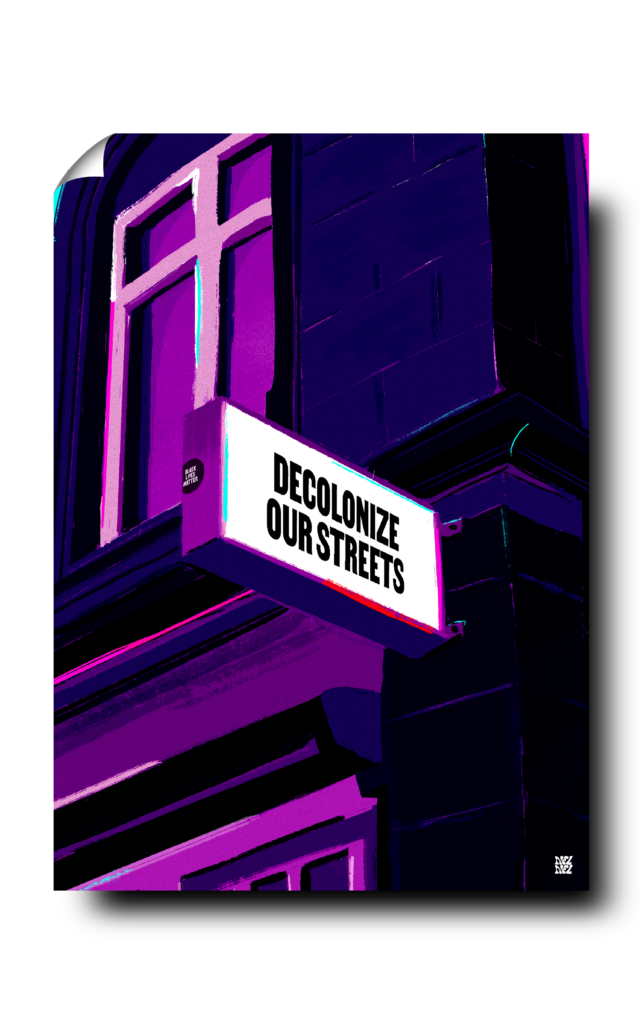


Just imagine arriving at Amsterdam Central Station. When you start walking westwards, away from the sounds of camera clicks and bicycle bells, towards the ‘Western Islands’, you start to notice the silence on these calm, 17th century cobblestone streets. On these streets, on an island called ‘Bickerseiland’, the sound of your footsteps, the flow of the water and the rushing wind becomes apparent. Amid these idyllic, restful sounds, it is hard to imagine that this place has a haunting past. This island was owned by the Bicker family, one of the wealthiest families of merchants in Amsterdam during the 17th century, that was directly involved in the slave trade. It is likely that slave ships of the West-Indian Company were being made at this very island from the Bicker family. When these slave ships sailed off, a historic human trauma was about to be created. Today, the sounds of places like Bickerseiland lead the way to a neglected memory about Dutch colonial trauma. Today, many buildings and streets in Amsterdam are still named after the people that profited from the slave trade. These silent, physical reminders of the haunting history of Amsterdam show us how the city is naturalizing a hegemonic version of history. Amsterdam is a landscape of memory in which the buildings, the streets, the water and our bodies - all considered as archives - construct a complex, social and bodily reality that is continuously influenced by traces of the past. As a city that was heavily involved with the slave trade and the enslavement of people, the materiality of the haunting is real. It seeped into the facades of the monumental warehouses. It grew into the streets and it saturated the water with painful memories. While the violence of forgetting in the Netherlands prevails, the trauma won't go anywhere. Listen to our archives. Listen to our haunted history. Decolonize our streets.
~ From Echoes of Slavery (graduation research Nel)
Just imagine arriving at Amsterdam Central Station. When you start walking westwards, away from the sounds of camera clicks and bicycle bells, towards the ‘Western Islands’, you start to notice the silence on these calm, 17th century cobblestone streets. On these streets, on an island called ‘Bickerseiland’, the sound of your footsteps, the flow of the water and the rushing wind becomes apparent. Amid these idyllic, restful sounds, it is hard to imagine that this place has a haunting past. This island was owned by the Bicker family, one of the wealthiest families of merchants in Amsterdam during the 17th century, that was directly involved in the slave trade. It is likely that slave ships of the West-Indian Company were being made at this very island from the Bicker family. When these slave ships sailed off, a historic human trauma was about to be created. Today, the sounds of places like Bickerseiland lead the way to a neglected memory about Dutch colonial trauma. Today, many buildings and streets in Amsterdam are still named after the people that profited from the slave trade. These silent, physical reminders of the haunting history of Amsterdam show us how the city is naturalizing a hegemonic version of history. Amsterdam is a landscape of memory in which the buildings, the streets, the water and our bodies - all considered as archives - construct a complex, social and bodily reality that is continuously influenced by traces of the past. As a city that was heavily involved with the slave trade and the enslavement of people, the materiality of the haunting is real. It seeped into the facades of the monumental warehouses. It grew into the streets and it saturated the water with painful memories. While the violence of forgetting in the Netherlands prevails, the trauma won't go anywhere. Listen to our archives. Listen to our haunted history. Decolonize our streets.
~ From Echoes of Slavery (graduation research Nel)
Description
High-quality Fine Art poster, unframed.
Size A1: 59,4 cm x 84,0 cm.
Matte 180 grams/m².
Limited edition print – edition of 25.
Signed and numbered with certificate of authenticity.
Donations
10% of all profits goes to The Black Archives. The Black Archives is a unique historical archive for inspiring conversations, activities and literature from Black and other perspectives that are often overlooked elsewhere. The Black Archives documents the history of black emancipation movements and individuals in the Netherlands. The Black Archives is managed by the New Urban Collective.
Usage
For Personal use only. Not available for commercial/gallery use without artist consent.
Packaging
Plastic free, FSC certified recyclable packaging with 70% recycled paper.
Every piece of art is dedicated to a deep history of activist work & critical (queer, antiracist & intersectional) research. That’s why with every artwork you buy, you strengthen an organization or action group that fights a particular social cause. Find out which group you support at the ‘Dontations’ tab above.

